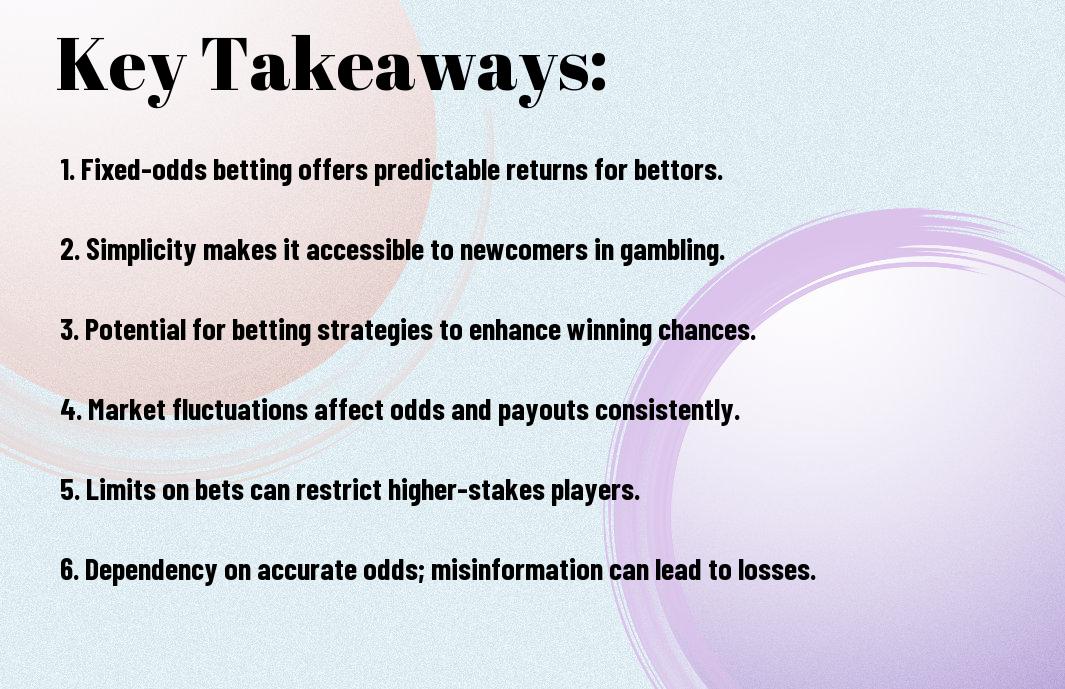As you examine into the world of sports betting, you’ll encounter various options, including fixed-odds betting. You may wonder how it works and what it offers. This type of betting allows you to place wagers with predetermined odds, giving you a clear understanding of your potential winnings. You can make informed decisions, and your betting experience becomes more predictable, but it also has its limitations, which you should consider to make the most of your bets.
Key Takeaways:
- Fixed-odds betting offers a transparent and predictable way of wagering, where the payout is determined at the time of placing the bet, allowing bettors to know exactly how much they can win.
- One of the main benefits of fixed-odds betting is that it eliminates the risk of odds changing after a bet has been placed, providing a level of certainty for bettors.
- Fixed-odds betting can be less volatile than other forms of betting, such as pari-mutuel betting, where the odds are determined by the pool of bets placed and can fluctuate significantly.
- A limitation of fixed-odds betting is that bookmakers may adjust the odds to manage their risk, which can result in less favorable odds for bettors, particularly for popular events or outcomes.
- Ultimately, fixed-odds betting requires a solid understanding of the odds and the event being bet on, as well as effective bankroll management, in order to maximize potential winnings and minimize losses.

Fixed-Odds Betting Fundamentals
For those new to the world of sports betting, understanding fixed-odds betting is important. You will find that it offers a straightforward way to wager on various events, with your potential winnings determined by the odds at the time of placing your bet.
Definition and Basic Mechanics
Before diving deeper, you should know that fixed-odds betting involves placing a bet at a fixed price, which is determined by the bookmaker. You will be paid out according to these odds if your bet wins.
Historical Evolution
By examining the history of fixed-odds betting, you can gain insight into how it has become a staple in the betting industry. You will see that it has evolved significantly over time, adapting to changes in technology and betting habits.
Even as you explore the historical evolution of fixed-odds betting further, you will notice that its development has been shaped by regulatory changes, advancements in technology, and shifts in consumer behavior, ultimately leading to the diverse and sophisticated betting market you engage with today.
Core Benefits
You can enjoy several advantages when engaging in fixed-odds betting, including predictable returns and effective risk management capabilities, which can enhance your overall betting experience and potential for success.
Predictable Returns
Central to the appeal of fixed-odds betting is the ability to know exactly how much you stand to win, allowing you to make informed decisions about your bets and manage your expectations accordingly.
Risk Management Capabilities
Against the backdrop of uncertainty in other forms of betting, fixed-odds betting offers you a sense of control over your risk exposure, enabling you to make strategic decisions that align with your betting goals and risk tolerance.
Even with the potential for losses, you can mitigate risks by setting limits, diversifying your bets, and carefully selecting the odds that offer the best value, thereby protecting your bankroll and ensuring a more sustainable betting experience.
Operational Framework
Unlike other forms of betting, fixed-odds betting operates within a structured framework, allowing you to make informed decisions about your wagers. You can navigate the system with ease, understanding the potential outcomes and associated risks.
Betting Markets and Options
One of the key aspects of fixed-odds betting is the variety of markets and options available to you. You can choose from a range of sports, events, and bet types, giving you flexibility and control over your betting experience.
Odds Calculation Methods
To calculate odds, bookmakers use complex algorithms and statistical models, taking into account various factors that may influence the outcome of an event. You can trust that the odds are determined by a combination of data analysis and expert judgment.
Markets fluctuate constantly, and as you place your bets, you’ll notice that odds can change rapidly. This is because bookmakers continually update their odds to reflect new information, ensuring that you have access to the most accurate and up-to-date odds possible, allowing you to make informed decisions about your wagers.

Risk Considerations
Keep in mind that fixed-odds betting comes with inherent risks, and you must be aware of them to make informed decisions. Your financial stability and betting strategy can be affected by these risks, so it’s crucial to consider them before placing a bet.
Financial Exposure Limits
Risking more than you can afford to lose is a common mistake, and you should set financial exposure limits to avoid significant losses. You can do this by allocating a specific amount for betting and sticking to it, ensuring your financial stability remains intact.
Regulatory Compliance
After verifying the legitimacy of a betting platform, you should ensure it complies with regulatory requirements. You need to check if the platform is licensed and regulated by a reputable authority, providing you with a safe and fair betting environment.
The regulatory compliance of a betting platform is crucial for your protection as a bettor. You should look for platforms that are transparent about their licensing and regulatory status, and that have a good reputation among bettors. This will help you avoid potential pitfalls and ensure a secure betting experience.
Market Impact
To understand the effects of fixed-odds betting, you need to consider its influence on the market. You will notice that fixed-odds betting can significantly impact market dynamics, as it allows you to place bets at predetermined odds, which can affect the overall betting landscape.
Economic Implications
The economic implications of fixed-odds betting are significant, as you will see that it can lead to increased betting activity, which in turn can generate more revenue for bookmakers and have a broader impact on the economy, affecting your betting decisions.
Industry Growth Patterns
Economically speaking, you will observe that fixed-odds betting has contributed to the growth of the betting industry, with more people engaging in this type of betting, which has led to an expansion of the market, offering you more opportunities to place bets.
Growth in the betting industry, driven by fixed-odds betting, has been steady, and you can expect it to continue as more countries legalize and regulate betting activities, providing you with a wider range of options and opportunities to engage in fixed-odds betting, which can help you make more informed decisions about your betting activities.
Technology Integration
Many fixed-odds betting operators have successfully integrated technology into their systems, allowing you to access a wide range of betting options and tools. This integration enables you to make informed decisions and manage your bets more effectively.
Digital Platforms
One of the key aspects of technology integration is the development of digital platforms, which provide you with a convenient and user-friendly interface to place your bets and track your progress. You can access these platforms from anywhere, at any time, making it easier for you to manage your betting activities.
Analytics Tools
Similar to other industries, platforms like data analytics have become vital in fixed-odds betting, offering you valuable insights into betting trends and patterns. You can use these tools to analyze your betting history and make adjustments to your strategy.
Digital advancements have led to the development of sophisticated analytics tools, which you can use to gain a deeper understanding of the betting market. You can analyze data on team performance, player statistics, and other factors that may influence the outcome of an event, allowing you to make more informed betting decisions and increase your chances of winning.
Final Words
Conclusively, as you weigh the pros and cons of fixed-odds betting, you will find that your understanding of its benefits and limitations is key to making informed decisions. You can leverage fixed-odds betting to your advantage by managing your risks and maximizing your returns. By considering your options carefully, you can navigate the world of fixed-odds betting with confidence, making the most of your betting experience. Your knowledge will be your greatest asset in this endeavor.
FAQ
Q: What is Fixed-Odds Betting and How Does it Work?
A: Fixed-odds betting is a type of wagering where the odds are determined at the time the bet is placed and do not change until the event is over. This means that the potential payout is fixed and known to the bettor from the moment they place their bet. For instance, if you bet on a football match with fixed odds of 2.0 for a home team win, you know exactly how much you will win if the home team emerges victorious, regardless of any subsequent changes in the market or other factors that might influence the outcome.
Q: What are the Benefits of Engaging in Fixed-Odds Betting?
A: The benefits of fixed-odds betting include transparency and predictability. Since the odds and potential winnings are clearly defined at the outset, bettors can make informed decisions based on the known risks and rewards. Additionally, fixed-odds betting can provide a form of protection against last-minute odds movements that might occur in other types of betting, such as live or in-play betting, where odds can fluctuate rapidly. This stability can be appealing to those who prefer a more controlled betting environment.
Q: What are the Limitations of Fixed-Odds Betting, and How Do They Impact Bettors?
A: One of the main limitations of fixed-odds betting is that it may not always offer the best available odds for an event, especially as the event approaches and more information becomes available. Since the odds are fixed at the time of the bet, bettors might find that they could have obtained better odds if they had waited or if they were participating in a different type of betting where odds can adjust in real-time. Furthermore, fixed-odds betting may lack the excitement and dynamic nature of other betting forms, such as live betting, where the odds change in response to the action unfolding, offering a more interactive experience for some bettors.



